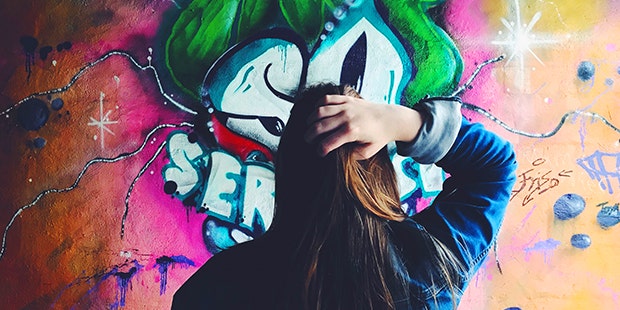What The 'Joker' Movie Teaches Us About Mental Health Awareness & Empathy
Put a smile on that face and take that stigma out of your heart.
 Paul Kapischka on unsplash
Paul Kapischka on unsplash Imagine spending your whole life desperate to be seen. You do everything you can to have someone look at you and see your value. You starve yourself, paint your face, learn to make people laugh by making a fool of yourself — still you feel worthless. You often are a punching bag, a laughing stock, a joke.
Such is the case with the Joker, a controversial fictional villain portrayed in multiple movies such as The Dark Knight, Suicide Squad and most recently, Joker, released this month.
Of course, these feelings aren't meant to serve as justification for the fictional actions of the Joker in the movies — where he commits acts of terrorism in order to create chaos in Gotham City. This is a plea to elicit understanding of the way we treat other people — that simple feelings of exclusion, loneliness and embarrassment, when reiterated and repeated consistently in our psyches, can shape our semblance of sanity and skew our mental health and view on the world.
This article is meant to be a plea to keep our eyes open to the early signs of mental illness and to normalize getting help — in the hopes of improving accessibility to therapy and professional help to those that need it most.
Mental health conditions vary in the ways that they are born. Some conditions are genetic, while some mental illnesses are born of circumstance. No matter the cause, symptoms can always be exasperated by one's environment.
There's a myriad of super villains to fawn over in the Marvel and DC universes, but the one we seem to be so culturally obsessed with is the Clowning Mad-Man commonly known as The Joker. There have been many takes on the character, demented on various scales, but all the same we find them to be mesmerizing.
Our fascination with the Joker is likely the psychological nature and enormity of his villainy what has us all so transfixed — an attempt at understanding a crime that has seemingly no purpose except to elicit the chaos it causes. It is born from mind that was beaten into a crippling level of powerlessness and misunderstanding of normal human emotions.
But we need to ask ourselves what the message is behind the Joker's madness.
Someone once told me that a good actor never plays a villain, because villains don’t think they’re villains. Instead, real villains tend to think that the bad things they're doing make sense, as if they are explaining why they took the back roads instead of the highway.
It is the Joker’s motivation to disrupt the corrupt — the corruption at the banks, in our businesses and governments. He thinks that by bringing people to the brink of psychosis — and even pushing some over the edge — he is breaking apart and exposing our weaknesses as human beings, exposing the cycle of systemic corruption that we're trapped in.
Relate the Joker, for example, to any of the recent acts of domestic terrorism. The problem is that we don’t understand what causes someone to "go off the deep end" in the first place.
We’ve heard the saying, “you can’t fight fire with fire," but you also can’t fight fire by ignoring it or downplaying it, either. There's a stigma around mental health issues — particularly mental illness — but in order to face our demons, we have to destigmatize it and make getting help more manageable by accepting the problems and putting them in a more positive light.
By being more understanding and knowledgeable of mental health issues, we can recognize the early signs in people, then hopefully work to get them the help they need and prevent their illness from getting worse and ultimately causing harm to society.
The movie, Joker premiered on October 4, 2019 during Mental Health Awareness month, and being that October 1st was World Smile Day — a day meant to spread kindness, good will, and understanding to the world — let’s allow this movie to be a message for all of us to remember to be kind, understanding and accepting of the people around us, even when they are different. When someone makes a joke, laugh. If someone smiles at you, try to smile back. And if you see signs of someone needing help with an underlying mental health issue, use empathy, compassion, and understanding to get them the professional help they need to heal and move forward in a positive way.
Let’s try to be the kind of people who support those who are struggling. Let’s put a real smile on that face.
Kaitlin Kaiser is a writer who covers astrology, pop culture and relationship topics.

